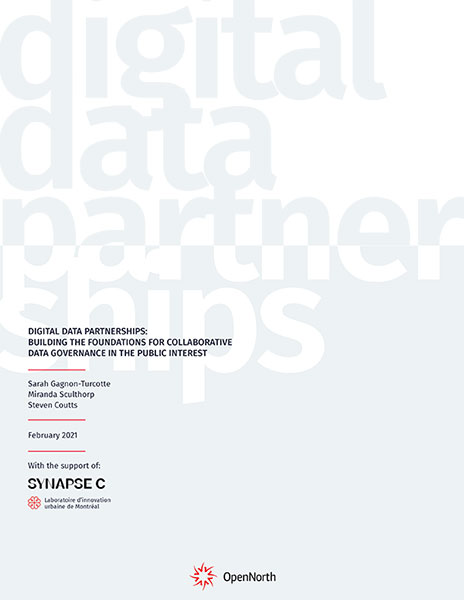Data sharing as a basis for new collaborations in the public interest
Nowadays, a growing number of public, private, and civil society actors are interested in sharing digital data. Motivated by the potential to solve complex social problems and create positive social impacts for the public good, new forms of inter-organizational collaboration are emerging to share, combine, overlay, and leverage datasets. Indeed, we find inspiring examples of data-driven collaboration in almost every sector of the economy, from health to arts and culture to mobility.
While digital data partnerships are multiplying and the evidence of their potential is mounting, these initiatives are not immune to the many risks, uncertainties, and challenges that characterize our current digital environment, whether they relate to privacy, data ownership, or the ethical use of data.
Responsible, effective and accountable data governance
To fully understand and address these complex data issues, stakeholders who engage in a data partnership require strong data governance. Data governance enables them to determine who makes decisions and how they will be held accountable for collecting, using, sharing, or controlling data. But what mechanisms should be put in place to ensure collaborative and effective data governance? What are the factors and mechanisms that make a data partnership successful? And what exactly does a data partnership in the public interest mean?
With these questions in mind, Open North’s Applied Research Lab embarked on studying digital data partnerships. In 2020, we initiated this research by partnering with two organizations committed to supporting data partnership initiatives in Quebec, the Montréal Urban Innovation Lab, and Synapse C.
Digital Data Partnerships: Building the Foundations for Collaborative Data Governance in the Public Interest
Today, we are very proud to announce that the result of this research is now available on our website, in the form of a report entitled “Digital data partnerships: Building the foundations for collaborative data governance in the public interest“.
This report was motivated by several common objectives. Through the creation of this report, we aimed to:
- Reinforce the capacities of actors in the data ecosystem, as they are required to adapt to changes in data use and regulations;
- Improve knowledge on data issues while exploring existing data governance models to identify factors that are specific to the Montréal context;
- Open the dialogue to as many people as possible to develop a fluid collaboration framework that can support well-defined decision-making processes.
This in-depth report details the various success factors of digital data partnerships while also providing practical information to guide the construction of shared data governance that is collaborative, responsible, efficient, and accountable.
Data governance mechanisms: practices that serve to protect the public and maintain public trust
Our research emphasizes that successful partnerships require data governance to protect the public and maintain its trust. Thus, throughout an entire chapter, we propose a set of data governance mechanisms including the concepts of informed consent, anonymization, risk assessment, data quality, standardization, and interoperability, among others. Readers will also find insights drawn from interviews conducted with a range of representatives from Montreal organizations. These findings allow readers to understand how data governance manifests itself in the day-to-day work of organizations.
Who stands to gain from this report?
This report is intended for anyone interested in data, especially those who want to explore the concepts of data sharing, data governance, and the common good. Indeed, we believe this report is of real value to a wide range of readers from different sectors and backgrounds, whether they are seeking to understand the fundamental components of data governance, or whether their organization is looking to enrich an existing data partnership.
Montréal en commun: a community of innovative projects
We are particularly hopeful that this research will become a key document to add to the open data toolkit of any entity that wishes to draw value from its data, from both an individual and collective perspective. Open North intends to apply the learnings from this report as we support the partners of Montréal en commun, the Montréal component of Canada’s Smart City Challenge, a program funded by the Government of Canada.
Open North as leader of data governance in Montréal en commun
As the leader of the data governance component of Montréal en commun, over the next four years, Open North will support a network of 12 partners driven by the desire to reimagine the City of Montréal. This community of projects represents a fertile ground for experimentation and innovation in collaborative data governance. Here, our goal is to support partners and collectively define clear data governance frameworks in which data is valued as a commons.
Ultimately, we look forward to sharing this report and its learnings to our community of partners at municipal, national, and global scales. We hope this report will further discussions, exchanges, and learning on data governance in the public interest at all levels.
